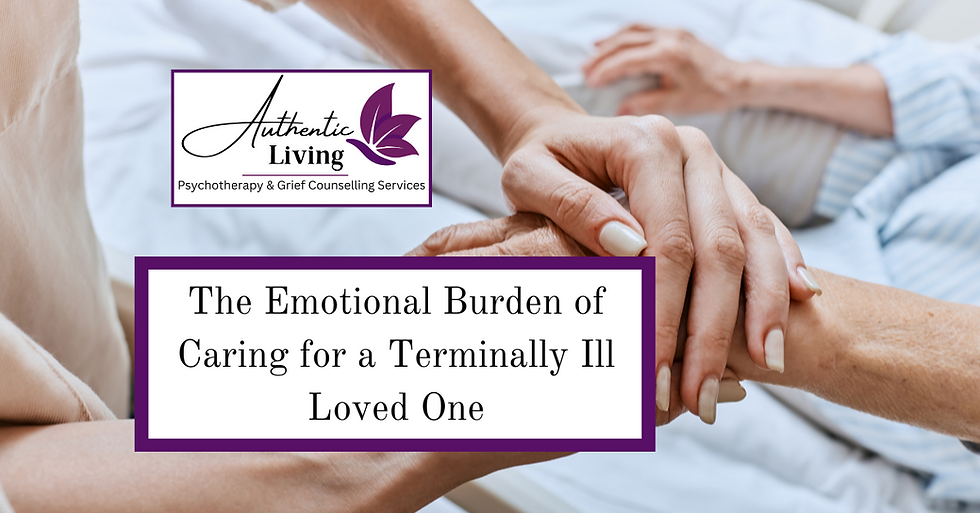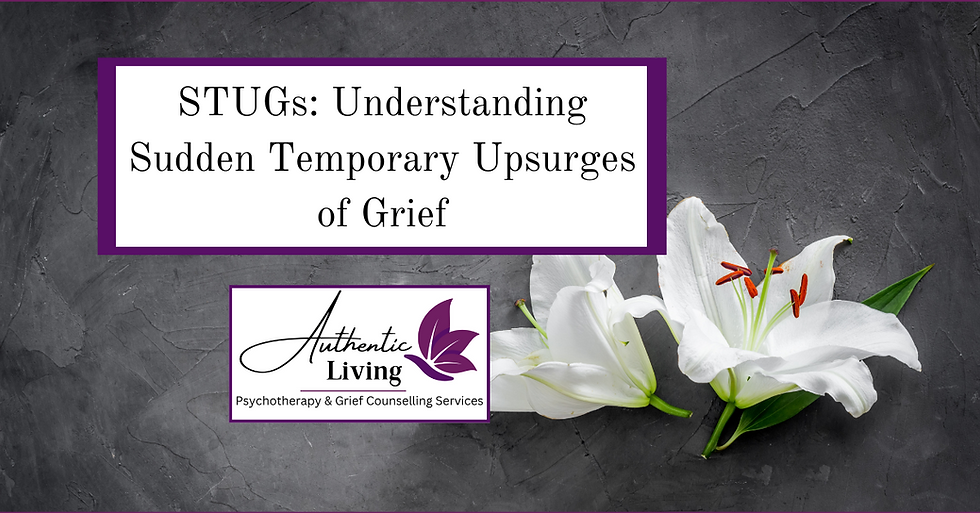Caregiver Stress: The Emotional Burden of Caring for a Terminally Ill Loved One
- Sep 5, 2025
- 5 min read
Caring for a terminally ill loved one is a deeply impactful experience that can evoke powerful feelings of love but can also lead to immense stress. As caregivers, individuals navigate a complicated web of emotions including sadness, anxiety, and guilt. This blog post explores the emotional toll of being a caregiver, offering practical insights and support for those facing similar challenges.

Understanding the Caregiver's Role, including the Related Caregiver Stress
Being a caregiver is a significant responsibility. It often means taking charge not only of the person's physical needs—like managing medications and coordinating medical appointments—but also providing emotional support. This balancing act can be incredibly exhausting. According to a survey by the National Alliance for Caregiving, approximately 61% of caregivers report feeling overwhelmed by their responsibilities.
Caregivers may often feel isolated as they prioritize their loved one’s needs over their own. This shift can lead to loneliness and feelings of despair. It's essential for caregivers to seek support, whether from friends, family, or professional resources.
The Emotional Toll
Anticipatory Grief
Caregivers often begin grieving long before death occurs. This is called anticipatory grief. It shows up in many ways: sadness when you notice decline, fear of what lies ahead, guilt when you feel exhausted or impatient, and anger at the unfairness of the situation. Caregivers live in a constant state of bracing themselves for loss.
Anticipatory grief is a common yet often unrecognized experience for caregivers of terminally ill patients.
Initially, caregivers might feel an array of emotions such as sadness, anger, or anxiety. They may mourn lost experiences as they reflect on the time they wished to spend together. Acknowledging these emotions is crucial; studies show that untreated grief can lead to chronic stress and even health issues for caregivers.
Emotional Exhaustion
Being emotionally present for a terminally ill loved one takes tremendous energy. Caregivers may put aside their own feelings in order to be strong for the person who is sick. Over time, this can lead to burnout, numbness, or feeling disconnected from themselves.
Role Reversal and Identity Shift
For those caring for a parent, the shift can be especially difficult. The parent who once cared for you now depends on you for basic needs. For partners, the relationship often changes from equal companionship to a more one-sided dynamic. These shifts can bring sadness and confusion about identity and role.
The Physical Toll
Caregiving is often physically demanding. Assisting with mobility, bathing, lifting, feeding, and medications can take a toll on the body. Many caregivers develop back pain, fatigue, and sleep problems. The constant stress also weakens the immune system, leaving caregivers more vulnerable to illness.
Caregivers frequently sacrifice their own medical appointments or rest because their focus is on the person they love. Over time, neglecting personal health can create long-term consequences.
The Social Toll
Caring for someone who is terminally ill can be isolating. Friends may drift away because they do not know what to say. Invitations may stop coming because caregivers are too exhausted or tied to responsibilities at home. Slowly, social circles shrink, leaving caregivers without the community they once relied on.
Even within families, tension can rise. Siblings may disagree about how care should be given, or one person may end up shouldering most of the responsibility. This can cause resentment and feelings of being unappreciated.
The Financial Toll
Providing care often comes with financial strain. Some caregivers cut back on work hours or leave their jobs entirely. Medical expenses, home care equipment, and transportation costs add up quickly. For many families, these sacrifices create financial insecurity on top of emotional distress.
The Spiritual and Existential Toll
Watching someone you love decline and approach death can raise deep spiritual questions. Caregivers may wrestle with faith, meaning, or the nature of suffering. Some people find comfort in spirituality, while others feel their beliefs shaken. This inner struggle can feel lonely and heavy, especially if there is little space to talk about it.
The Hidden Cost of Love
Despite the many challenges, caregivers often continue without hesitation because love compels them. Yet love does not erase the cost. Many caregivers say they feel invisible because the focus is understandably on the person who is ill. Their pain, grief, and exhaustion often go unnoticed.
The Impact on Mental Health
Caregivers’ mental health can deteriorate significantly because of the stress associated with caregiving. A report from the Family Caregiver Alliance indicates that caregivers are 2.5 times more likely to experience depression than non-caregivers. The constant anxiety
about a loved one’s health can result in sleepless nights and neglect of personal well-being.
Prioritizing mental health is essential. Caregivers should consider therapy or counseling, which can serve as a supportive outlet for their emotions. Many clinics offer specialized services, catering specifically to the needs of caregivers.
The Importance of Self-Care
Self-care is not a luxury; it is a necessity for caregivers. Taking time to recharge can help prevent burnout. Engaging in simple activities, like a daily walk, reading, or socializing with friends, can greatly enhance well-being.
Moreover, joining support groups can provide much-needed connection. Engaging with others who understand the struggles of caregiving can foster a sense of community. According to a report from the American Psychological Association, caregivers who seek social support report lower levels of stress and greater life satisfaction.
Navigating Relationships
Caring for a terminally ill loved one can strain relationships with family and friends. It is common for caregivers to feel misunderstood, which may lead to resentment. Open communication is vital. Caregivers should express their feelings and needs to loved ones, which can foster understanding and cooperation.
Setting boundaries is equally important. Caregivers must feel empowered to ask for help and delegate tasks. This not only alleviates the burden but also allows caregivers to dedicate more time to their loved one without sacrificing their own well-being.
Finding Meaning in the Experience
Though caring for a terminally ill loved one is undeniably tough, it can also foster deep connections and love. Many caregivers find a sense of purpose in their role, appreciating the intimacy of the moments shared.
Creating cherished memories—whether through storytelling, sharing laughter, or simply holding hands—can provide comfort during dark times. Focusing on these positive moments can help caregivers manage the emotional challenges they face.

Seeking Professional Help
If the emotional burden becomes too heavy to bear, seeking professional help is a vital step toward healing. Therapists and counselors can equip caregivers with valuable coping strategies tailored to their unique challenges.
Many psychotherapy clinics provide specialized support for caregivers, helping them navigate the complexities of grief, stress, and anxiety. These professionals can serve as a guiding light, ensuring caregivers don’t have to face these struggles in isolation.
The Journey Ahead
Caring for a terminally ill loved one is a path filled with deep emotional challenges. The pressures of responsibility, anticipatory grief, and the impact on mental health can feel overwhelming. Yet, it is crucial for caregivers to prioritize their well-being and reach out for support when they need it.
Practicing self-care, communicating openly with loved ones, and finding meaning in this experience can empower caregivers to navigate this difficult journey with resilience. Remember, you are not alone. Support is available, and taking care of yourself is just as important as the care you provide to your loved one.
If you are struggling with the weight of being a caregiver, we are here for you. We have therapists, like Jeanette Leroux, who specialize in end of life issues including anticipatory
grief, MAID counselling, and depression. Call today to book a free 15 minute discovery call.
Your story matters. Your struggle matters. You matter.












Comments